PART ONE- WHY BALAAM WAS A FALSE PROPHET EVEN THOUGH HIS FOUR PROPHECIES WERE TRUE; SONGS IN THE GOSPEL OF LUKE
OLD TESTAMENT READING: NUMBERS 22:21-23:30 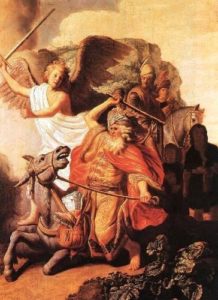
Balaam had been known as a broker of blessings and curses. Like many ‘career occultists’, he received bids from those who needed help and was all too ready to comply.
The apostle Peter writes about false prophets in his second epistle in the New Testament. He describes them as those “who secretly introduce destructive heresies”, who “deny the Master”, “follow their sensuality”, “in their greed exploit others” “with false words”, and “entice unstable souls”. He then describes the path that Balaam took, saying “forsaking the right way, they have gone astray, having followed the way of Balaam, the son of Beor, who “loved the wages of unrighteousness”. (2 Peter 2:1-15)
Jude, the half-brother of Jesus, puts Balaam in the category of Cain and Korah, for they all “reviled the things which they did not understand” (Jude 1:10-11).
When Balak, king of Moab, needed someone to curse Israel, he solicited the help of Balaam, a man who had an international reputation as having supernatural powers in both blessing and cursing. He spared no expense to gain his services, although Balaam was from more than 400 miles away (Numbers 22:6). Balaam lived in Pethor, northeast of Palestine in the region of Syria and Mesopotamia where many gods were worshiped. There is no indication that Balaam was exclusively in the service of the God of Israel, although it is clear that he was familiar with Yahweh and in this instance called upon His Name.
King Balak sent the distinguished elders of Moab to recruit Balaam. Their god was Chemosh (Numbers 21:29) but they would accept the services of any deity that was up to the task of cursing Israel. They traveled for days with fees in hand. They had sufficient money for any prophet. Balaam received them well and put them up overnight. When he learns of their request to curse Israel, he promises to get back to them after the LORD (Yahweh of Israel) speaks to him. The fact that Balaam does not warn them that those who curse Israel will be cursed, indicates that Balaam had little understanding of the introductory promise given by YAHWEH to Abraham or he was unwilling to be truthful to his guests.
That night the LORD does in fact speak to him. He commands Balaam not to go with the men from Moab and not to curse the Israelites, for they are blessed.
When Balaam reports to the delegates from Moab that the LORD has refused to let him go back with them, he only tells them part of the message. He does not tell them God clearly said that the Israelites are blessed. If Balaam had the character of a true prophet of God, he would have esteemed the word of Yahweh by refusing further solicitations and he would have spoken the full truth about Yahweh’s blessing.
But false prophets are experts in speaking partial truths. They will be careful not to offend their clientele.
When the elders report Balaam’s refusal to King Balak, the king of Moab sends a more impressive group of representatives, persuasive princes who promise to bestow great honor upon Balaam and whatever fee he might ask for. Although God had already made known His will, Balaam wants to keep the door open for future business. He understands that the God of Israel has put an irrevocable blessing upon His people. He communicates to the Moabites that he is bound to God’s word without saying what God’s word is. He says, “Though Balak were to give me his house full of silver and gold, I could not do anything, either small or great, contrary to the command of the LORD my God” (Numbers 22:18). This sound bite is designed to give his Moabite customers reason to believe he truly submitted to God and that his services would be a great asset to their cause. The deepest longings of Balaam’s heart are for honor and wealth. That motive governs his behavior. He is happy to host the princes and to inquire to see if the LORD has more to say on the subject. God again comes to Balaam and says, “If the men have come to call you, rise up and go with them; but only the word which I speak shall you do” (Numbers 22:20).
With God’s permission, Balaam saddles his donkey and goes with the leaders of Moab. Although he is complying with the permissive will of God, we learn that God is angry that Balaam is determined to go against His original command. Balaam knew what God wanted him to do but did not want to shut the door on the opportunity of serving these great men and being respected by them.
We see once again that God often uses people He is not pleased with, who do things that He hates, in order to accomplish His greater purposes. His ‘will of desire or command’ is different from His ‘permissive will’. In His permissive will, God allows people to do things that He has forbidden in order that His ultimate Will will be accomplished. We see this in the genealogy of Jesus. The sexual sins of Judah and King David which were against God’s moral ‘will of command’, are in the end proved to be in the sovereign will of God, in that the prophetic lineage of the Messiah is upheld.
King Balak wants to hire Balaam to curse Israel. To curse Israel would be a violation of God’s command. But the LORD will sovereignly overrule and use Balaam to bless Israel.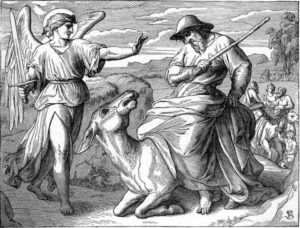
God will make a display of Balaam’s foolishness. He will demonstrate that God can put words into the mouth of a donkey as easily as in the mouth of a man, and a donkey can have more vision of what is real and true than someone who professes to be a divine seer!
The apostle Peter writes,
but he received a rebuke for his own transgression, for a mute donkey, speaking with a voice of a man, restrained the madness of the prophet. (2 Peter 2:16; NASB)
God has to pull the sword against sinful men and reveal what is in the heart.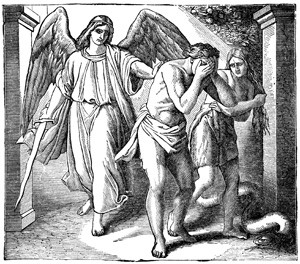
In the Book of Genesis, we first see the angels in action guarding the way to the tree of life, preventing unholy mankind from eternally perpetuating his unholy state. The cherubim with flaming swords at the east of the Garden of Eden know that sinful men need to go to the tree of death (the cross, where they are crucified with Christ) before they can have access to the tree of life as “in Christ ones” (Gen 3:24). The cherubim are next seen pictured upon the curtains that hang on the east side of the tabernacle, and again on the veil that guards access to the Holiest of All. The cherubim also guard the mercyseat watching over the ark of the Covenant. Mankind can only have access to the tree of life, the presence of God’s glory, by means of the death of Christ evidenced by His shed blood. These angels stand guard protecting God’s interests. God’s justice must be satisfied, the testimony of God’s holiness must be protected. Sin must be put away and mankind born anew in Christ if fellowship in eternal life is to be established. Therefore, the blood of the sacrifice must be upon the mercyseat before the glory of the Lord will fill the inner sanctuary.
Later in the unfolding story, Joshua will meet an angel with a drawn sword.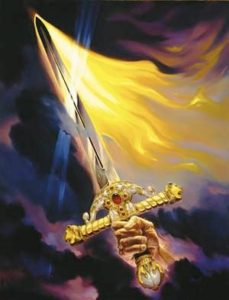
13 Now it came about when Joshua was by Jericho, that he lifted up his eyes and looked, and behold, a man was standing opposite him with his sword drawn in his hand, and Joshua went to him and said to him, “Are you for us or for our adversaries?” 14 He said, “No; rather I indeed come now as captain of the host of the LORD.” And Joshua fell on his face to the earth, and bowed down, and said to him, “What has my lord to say to his servant?” Joshua 5:13-14 (NASB)
Balaam is not quick to bow to the Lord. His donkey is more prone to do so than he is. Nor is he quick to admit his stubborn rebellion and greed.
As Balaam and his donkey set out with the Moabite dignitaries, the angel of the Lord stands in his way with a sword drawn against him. Balaam, the so-called seer, is blind to the presence of the Lord’s messenger. However, his donkey sees the angel and is terrified. The animal turns off from the way and goes onto a field. Balaam beats the donkey. The angel of the Lord once again stands in Balaam’s way. This time he stands in a narrow path of the vineyard with a wall on both sides. There was no place for the donkey to turn, to the right or to the left. Therefore, the donkey leans away from the angel, pressing Balaam’s foot against the wall. Balaam beats his donkey again. The angel of the LORD goes further and again stands in a place where the donkey has no recourse but to lay down under Balaam. Once more Balaam beats the donkey.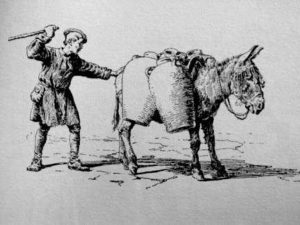
Then the LORD opens the donkey’s mouth and speaks: “What have I done to you, that you have struck me these three times?”
Some discount the veracity of this account of a talking beast. The Bible does not say that this donkey had the ability to speak. Peter says that the donkey was mute. But God spoke through the animal on this occasion with a human voice. If God can project audible words from a burning bush or a cloud of glory, He can put His words in the mouth of a beast of burden.
Balaam hardly seems humbled by this supernatural intervention by which his donkey speaks to him. Instead, he defends his stubbornness. It is only when the LORD opens his eyes to the angel that he bows to the ground.
32 The angel of the LORD said to him, “Why have you struck your donkey these three times? Behold, I have come out as an adversary, because your way was contrary to me. Numbers 22:32 (NASB)
What kind of external dealing is required in our lives for God to make known that our ways are contrary to His? What kind of dealing is needed for us to recognize our sin?
Balaam, confessed, “I have sinned”, and expresses his willingness to go back if that is pleasing to the angel. But the angel of the LORD tells him to go with the men of Moab and commands him: “You shall speak only the word which I tell you.” (22:35). (The angel of the Lord is identified here as God- the One who said earlier the same thing.)
Balak takes Balaam to the high places, the pagan altars of Baal from where he only can see a portion of the people of Israel camping in the valley. Balaam asks Balak to build seven altars and prepare seven bulls and rams for the LORD.
Balaam gives 4 prophetic parables. Each one of them is true. They are the words put in his mouth by the same Sovereign Lord that could put words in the mouth of the donkey.
There are four messages that are given from different vantage points.
The first message is from Kiriath-huzoth- the city of streets, where Balaam prophecies from the high places of Baal, from where he can see only a portion of the people of Israel.
MESSAGE 1. ISRAEL IS A SEPARATE PEOPLE
9 “As I see him from the top of the rocks, And I look at him from the hills; Behold, a people who dwells apart, and will not be reckoned among the nations. Numbers 23:9 (NASB)
God’s people are called to be holy because God is holy. Their covenant relationship with God distinguishes them. Their laws, their Sabbath, and their behavior are counter-cultural.
Balak is upset that Balaam pronounces a blessing rather than a curse. (Numbers 23:11). Balak takes Balaam to the field of Zophim (lit. the lookout, spying place) on the top of Pisgah (the cleft of the rock), which affords a great view of the Promised Land across the Jordan.
MESSAGE 2: ISRAEL WILL BE A VICTORIOUS PEOPLE because the LORD has blessed them and is in their midst.
From this new vantage point, Balaam again prophecies that Israel has an irrevocable blessing:
19 “God is not a man, that He should lie, nor a son of man, that He should repent; Has He said, and will He not do it? Or has He spoken, and will He not make it good? 20 “Behold, I have received a command to bless; When He has blessed, then I cannot revoke it.”
Numbers 23:19-20 (NASB)
Instead of seeing Israel’s many faults, from this vantage point, Balaam proclaims:
21 “He has not observed misfortune in Jacob; Nor has He seen trouble in Israel; The LORD his God is with him, And the shout of a king is among them.”
Numbers 23:21 (NASB)
Israel will be victorious. For the Lord, His God is with them. And so is the shout of a King in the people who have no king but their God.
Prophecy # 3 and # 4 will be in tomorrow’s reading.
NEW TESTAMENT READING: LUKE 1:57-80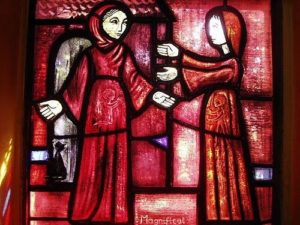
The Gospel of Luke not only records the historical narrative of the events surrounding Jesus’ birth, as he must have gleaned them from Mary, but he records these songs of praise. This gives us great insight into Mary. She was one who pondered God’s word in her heart and committed what God said to memory. Many people did this through turning what they heard from God into song. In the first chapter, we hear two songs. The first was Mary’s song of praise, “The Magnificat”. We can see how many images emerge from the Old Testament Scriptures that she had stored in her heart. The song we hear today is the one from Zechariah.
When John the Baptist is born, according to the promise of God, his father, Zacharias prophecies in song. The prophecy heralds the role of his son:
76 “And you, child, will be called the prophet of the Most High; For you will go on BEFORE THE LORD TO PREPARE HIS WAYS; 77 To give to His people the knowledge of salvation by the forgiveness of their sins, 78 Because of the tender mercy of our God, with which the Sunrise from on high will visit us, 79 TO SHINE UPON THOSE WHO SIT IN DARKNESS AND THE SHADOW OF DEATH, To guide our feet into the way of peace.”
Luke 1:76-79 (NASB)
READING FROM PSALMS
Psalm 58:1-11;
We desire injustices to be put right, especially when we have suffered them personally. This Psalm takes up the theme of injustice in a broader sense. It speaks of injustices perpetrated by those in authority; rulers who plot injustice and spread violence throughout the land. Psalm 58, verses 1 through 5 describe their evil ways.
We know that God is a God who loves justice. Therefore, the Psalmist makes a plea that God punish the wrongdoer (in verses 6 through 9).
The final verses (10-11) describe the joy of the godly when injustice is avenged.
In earlier Psalms, David expressed his personal need for God’s mercy (Psalm 51). We must never forget this. The good news involves both God’s justice and His mercy. Justice demands penalty to the wrongdoer. When we are faced with God’s justice, we recognize that all sin is a violation of His law and therefore is an offense against Him personally. All of us have sinned and are in need of the removal of God’s wrath against our sin. To be given a full pardon is mercy. God goes further- He devises a way for His full favor to be restored to us by imputing the righteousness of Christ to us. God’s desire for both justice and mercy is perfectly satisfied in the cross.
“The LORD, the LORD God, compassionate and gracious, slow to anger, and abounding in lovingkindness and truth; 7 who keeps lovingkindness for thousands, who forgives iniquity, transgression and sin; yet He will by no means leave the guilty unpunished.” (Exodus 34:6-7).
1 Peter 3:18 (NASB) 18 For Christ also died for sins once for all, the just for the unjust, so that He might bring us to God, having been put to death in the flesh, but made alive in the spirit;
The gift of God’s life, being made alive in the spirit, is the reward for those who have been made right with Him through faith in the finished work of His Son, Jesus Christ.
We can rejoice in God’s mercy while at the same time saying, “Surely there is a God who judges on earth!” (Psalm 58:11)
TODAY’S PROVERBS
Proverbs 11:12-13 (NASB) 12 He who despises his neighbor lacks sense, but a man of understanding keeps silent. 13 He who goes about as a talebearer reveals secrets, but he who is trustworthy conceals a matter.
These proverbs give good advice on appropriate responses to difficult people and difficult situations. We may find people difficult to live with, but we need not despise them. Your attitude depends upon you. “ If possible, so far as it depends on you, be at peace with all men.” (Romans 12:18). You are responsible for your speech. At times it is wise to withhold your criticism. There are appropriate and inappropriate ways to share your opinions. We build trust when we know whether or not it is appropriate to share information.
PRAYER FOR THE NATIONS: TODAY WE PRAY FOR THE COUNTRY OF BRAZIL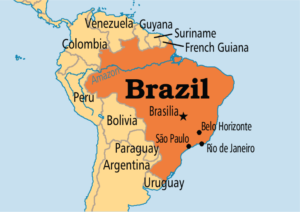
Brazil is a developing country that now has one of the largest evangelical populations in the world. One of the great needs of this country is to equip the saints, evangelize the lost, and establish healthy, reproductive disciple-making churches.
New Life Community Church has been involved in evangelism, equipping, and church planting in Brazil for many years and remains in relationship with the leaders of various ministries.
We have worked with missionaries and pastors from different denominations in the states of São Paulo, Parana, and Rio de Janeiro. Please pray for our brothers and sisters in Brazil today.
Prayer information for Brazil can be found on pages 162-169 of OPERATION WORLD.
Challenge for Prayer
The nation and government have made great strides but still face massive challenges. Pray about the following:
a) Endemic corruption and cronyism have been addressed aggressively, and idolatrous structures are crumbling. These have come at some cost, but they are moves in the right direction, bringing political accountability and economic transparency, establishing justice and enabling economic opportunity. Pray that future governments would not shirk from the painful but necessary process of excising all that is putrid and corrupt.
b) Poverty still affects tens of millions. Admirable reforms and progress are being achieved, but a significant proportion of dwellers in large cities still live in poverty-stricken, crime-ridden favelas, and the education and health care sectors are in serious need of improvement. The poor, especially street children and indigenous peoples, often suffer terrible discrimination and exploitation. Debt slavery affects up to 250,000 people (the official number is 25,000), especially in the Amazon.
c) Crime is a serious problem. Brazil is the world’s second-highest consumer of illicit drugs and has the world’s highest rate of firearm homicides. Nearly 150 people a day were murdered in Brazil in the years between 2000 and 2010. The police response has been brutally heavy-handed and rife with corruption, and the nation’s prisons are notoriously overcrowded and violent. Unprecedented breakthrough, spiritual and social, is needed to turn this around.
d) Racial differences may not seem an issue in the ethnic melting pot of Brazil, but statistics bear out a different view of Brazil’s complex racial context. While blacks/morenos are 40% of the population, they only account for 3% of college graduates and form the majority of Brazil’s poor. Although nearly half have African ancestry, less than 7% openly claim it on the census. This is, however, more a case of social rather than racial discrimination.
e) BRAZIL is a spiritually open country. Although “non-religion” is actually the fastest growing faith group, few of that category would be hard-core atheists. Most follow Afro-Brazilian cults (such as Candomblé, Macumba, Umbanda) derived from African animism and witchcraft, but “high spiritism” (Kardecism) is more popular among whites. Only 1.3% identified themselves as Spiritists in the census but around 10 million practice, and even one third or more Brazilians visit Spiritist priests or guides.
Pray for all spiritual falsehoods to be exposed as such and for Christ alone to be exalted as Lord in Brazil; pray for those in actual spiritual bondage to be delivered through Jesus.
PRAYER: Heavenly Father, we do not take it lightly, that You have commanded a blessing upon us who are in Christ Jesus. We rejoice that we can say we have been blessed with every spiritual blessing in Christ Jesus. It is a blessing that cannot be reversed. Thank You for drawing us to Your Son, enlightening us with the knowledge of Your grace and guiding us into the way of peace. We are grateful for the mercy we have received and ask that we would minister the truth about your mercy and grace to others, In Jesus’ Name. Amen.
In His gracious care,
PASTOR DAVID
So, naturally, we proclaim Christ! We warn everyone we meet, and we teach everyone we can, all that we know about him, so that, if possible, we may bring every man up to his full maturity in Christ. (Colossians 1:28, J.B. Phillips paraphrase)
New Life Community Church, Concord, MA 10742
www.newlife.org
Meeting Sundays at 10:30 AM at the New Life Ministry Center, 221 Baker Avenue, Concord, MA 01742
Church Office- 978-369-0061
New Life Fine Arts
“Theater you can believe in.”
www.newlifefinearts.org
